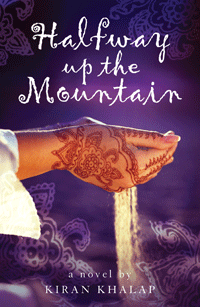
Halfway
up the Mountain
Kiran Khalap
Maya, named for the Sanskrit word for 'illusion', is a girl on the cusp of womanhood.
Her fate is tied, via an arranged marriage, to Ravindra. In prose similar to a hymn to cultural differences, Khalap has created a miniature microcosm of Indian society. Ravindra becomes a famous artist, but the marriage falls apart when Maya mets the poet, Krishnarao. Ravindra exiles himself to New York, and Maya must make her way alone with her spurned son, Sharan, in an India hostile to single mothers. A tale of snakebites, separation and sadness.
'You peek at your husband to be while he slurps his tea from a saucer, smelling of Lifebuoy soap ... your father-in-law, Shantaram Patil a.k.a. Nana, in Terrycot trousers and nylon shirt, with big gold ring warmed by the beedi held upright in the last two fingers, mixing smoke and ash for a better kick, snaps his fingers to encourage the ash to submit to gravity.'
To read an extract of this title click here
Review - The Morning Star - October 2005
THE sweet spicy aromas, exotic sounds and colours of India flow easily from the pages of this novel, but so does the heat and stink of its urban slums.
We are becoming accustomed to good writing coming out of India and this one, Kiran Khalap's debut, is another to add to the list.
It will invariably be compared with Arundhati Roy's God of Small Things, with which it has some common elements.
But this stands out as unusual in that the author, a man, tells the story of the coming of age of a young woman.
Maya is a country girl, born to a poor rural family, but given a rudimentary education by her father before he deserts the family home for good.
She learned to speak English and has developed a love of poetry and literature.
Barely into her teens, she is married off to a sign painter and transported to the urban squalor of Bombay, before slowly struggling to find her independence and confidence.
She eventually manages to become senior administrator at a private school and thus financially independent.
It is a simple story with no major dramas or plot complexities, but conveys superbly the rhythms and pace of modern India straining to break free of its traditional integuments.
It reflects, on a personal level, the conflict between strong and vibrant traditions, so essential for social cohesion, with the bludgeoning demands of the modern.
Khalap writes a form of poetic prose. "Outside, rats nibble at moonbeams. The white powder drifts to the soil, covering it with satin sparks, unable to prevent the ammonia vapours that rise from tens of drunken men's piss."
The text is littered with metaphors and wonderfully evocative images, even though, at times, they become somewhat strained. "The dusk-smeared mountains have tucked up their skirts after a hot day, to air their quilted cellulite."
This is, though, an empathetic, sensitive novel that gets under the skin of its young female protagonist.
The supporting characters are also strongly drawn.
Maybe, as a story, it is a little idealised, but it rings basically true and is suffused with a deep humanity and understanding of people. A powerful debut novel.
Price: £8.95 $14.95
Format: Paperback, 278pp
ISBN: 0-7145-3113-8 Fiction
Publication date: June 2005
